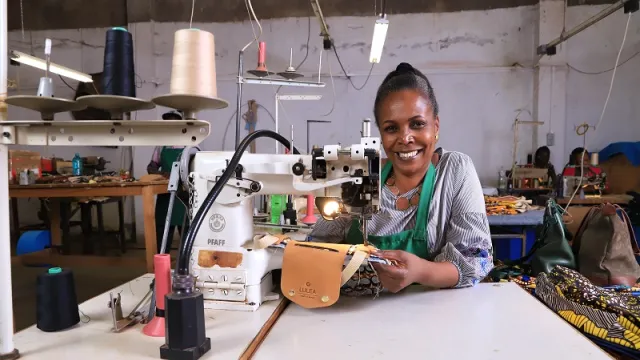Building back better women owned firms from pandemic ruin

Building back better women owned firms from pandemic ruin
Across Kenya, malls and cafés are filling up again unlike at the same time a year ago and Nancy Warungi is happy about it.
With increasing footfall in malls, regular global travel and tourism numbers peaking, her leather products were flying out of the knitting lines from her Thika workshop just before Covid-19 struck.
“With lockdowns, however, people were no longer going out for shopping. We entered into a season of low demand as tourists stopped coming as countries across the world imposed travel restrictions,” said Ms Warungi, looking back at a season that has hit her business hard.
A little over 18 months ago, her company Luxury Leather Kenya Ltd trading as LULEA was booming, selling a range of leather products such as their iconic shopping bag that is fit enough to carry 15 kilos of shopping but at the same time it can fold into small bag for customers’ convenience.
“We thought we could venture into making masks but it didn’t work out for us. We sent workers home,” said the Director and co-founder of LULEA, a Kenyan firm that was making products for some US and Ireland based companies.
Read also: By going big on super foods, Kakuzi cements base for sturdy growth
For Ms Warungi, however, a helping hand from the pandemic induced economic ruin has come through in Unilever’s Sunlight Women in Business Programme.
At the first stage of the programme in 2020, Sunlight had partnered with the United Nations Institute for Training and Research (UNITAR) to train fifty women in entrepreneurship, innovation and financial literacy.
At the moment, the Sunlight programme is seeking to strengthen the partnership and join forces with Absa Bank Kenya and UNITAR to scale up the training of an additional 5000 women this year – a hundred-fold increase.
The target is to impart skills in an estimated 100,000 women entrepreneurs under ‘Sunlight Women of More’ programme.
Ms Warungi, who started her entrepreneurship journey in 2013 making her own line of leather sandals and selling them in hotels frequented by tourists in Kenya, has benefited from the Sunlight booster programme.
“When they put up a billboard marketing my business, I even got a call from the Ministry of Industrialization seeking to visit my workshop. I would get customer phone calls all day,” noted Ms Warungi, who helped pitch and win the organization’s E4Impact seed grants.
Industry data shows that women owned enterprises make a significant contribution to the Kenyan economy, accounting for 48 per cent of all micro-small and medium sized businesses, which yields about 20 per cent of the country’s GDP.
However, women entrepreneurs keep grappling with many challenges that often tip the scales against them, making it difficult to succeed with certain opportunities, notes Absa Bank Kenya Director Business Banking Elizabeth Wasunna.
“This partnership will go a long way in addressing historic challenges that face women entrepreneurs and support them grow. The COVID-19 pandemic has given rise to more entrepreneurs, and we believe that with the right financial literacy, these businesses can grow exponentially,” Ms Wasunna added.

According to Absa Bank, there is need to encourage women entrepreneurs to register their businesses, formalise their operations and keep good records of their transactions as this helps attract investments and credit.
“The COVID-19 pandemic has significantly delayed and derailed the progress towards the Sustainable Development Goals, affecting marginalized populations, such as women, more than others. Women need to become leaders and agents of change in their communities and societies – programmes such as ‘Sunlight Women of More’ greatly increase this likelihood,” said Mihoko Kumamoto, Director for Division for Prosperity, UNITAR.
The Sunlight campaign is pegged on two pillars; media and education to sustain its promise.
Under the media pillar, women entrepreneurs will get visibility through digital, radio and out of home advertising platforms such as billboards.
The education plank will provide financial, literacy and marketing skills training.
To be eligible for the programme, women entrepreneurs must own a business that has been in operation for at least a year, and be ready to learn and provide positive impact to the society.



